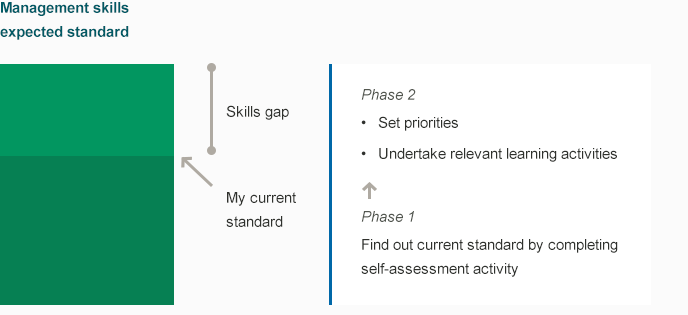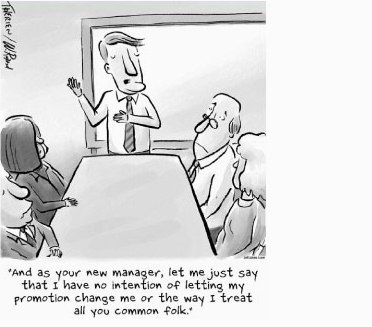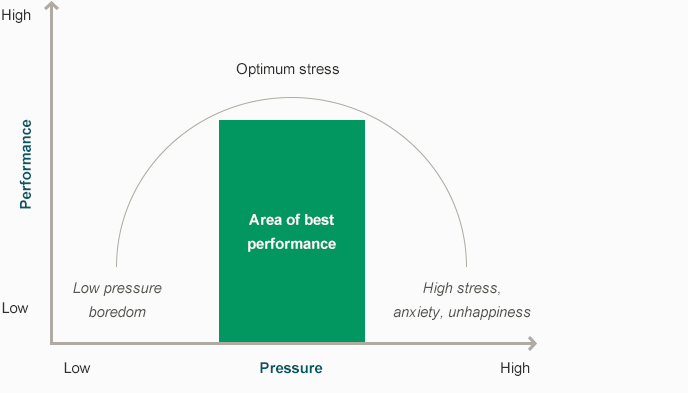Everybody is different and we adapt our style, to some extent, when dealing with different people in different contexts. If you have never reflected much on the impact of your behaviour and your style on others, now is the time: because the first thing a manager needs to manage is self.
This chapter covers the following topics:
- do a stock-take – find out if you have the full range of management capabilities
- how do you treat others? – understanding and demonstrating organisational values
- how are people responding to you? – how to deal with others’ perceptions of your management ability
- reduce your blind spots – seeking and dealing with feedback
- build your external support crew – when to seek out mentors or coaches
- look after yourself – your health and wellbeing is the foundation for success.
Do a stock-take
As a manager you can have an enormous impact on the success of your team. Your competence in key areas and the way in which you conduct yourself in relation to others affects the productivity and wellbeing of your team.
Reflecting on self and style helps highlight natural skill matches, skill gaps and possible mismatches or dislikes. You may uncover biases and patterns of behaviour that you need to manage around or grow beyond – most new managers do.
Behaviours that have been useful for you in the past may need to be adapted as you move from team member to team manager.
An honest self-assessment is a useful starting place for understanding yourself and your management capabilities. The 13 development areas that the Victorian Public Sector Commission (VPSC) has identified as being important to all Victorian public sector managers provide a good basis for this assessment.
Management role foundations
What are your skills and comfort levels around the following core knowledge, skills and behaviours that managers use every day?
1. Understanding and developing yourself
2. Applying different styles of management to different situations
3. Persevering to achieve outcomes in the face of set-backs and challenges
4. Utilising advanced interpersonal skills to engage people in intelligent and compelling ways
5. Thinking and acting strategically.
Management role activities:
How skilled are you at the following tasks and actions that managers need to undertake to deliver outcomes?
6. Overseeing operations, projects and resources in the Victorian public sector
7. Managing and developing people in the Victorian public sector
8. Managing difficult situations involving the people you manage
9. Managing attraction and recruitment activity in the Victorian public sector
10. Collaborating across and beyond the Victorian public sector
11. Working with diversity in the Victorian public sector
12. Managing during organisational change
13. Contributing to public policy.
Suggested activity
Use the VPSC publication, Great manager, great results: Self assessment and development planning template for Victorian public sector managers, to assess how you are performing in each of the above 13 areas. The publication also provides advice on identifying your skill gaps and priorities for development, as well as selecting effective development activities.
Over time, you should plan to develop all 13 areas in order to succeed in your management role. Initially though, you should focus on the areas most relevant to your current work (your manager should be able to help you with this).
Figure 2. How good are your management skills? (Identify your skill gaps)
How do you treat others?
When discussing what your manager expects you to achieve, it is also important to discuss how you will achieve it. As a manager you are expected to play a key role in upholding the values outlined in the Public Administration Act. These are responsiveness, respect, integrity, impartiality, accountability, leadership and supporting human rights.
The Code of Conduct for public sector employees describes how we demonstrate the values in our behaviours and, in effect, sets minimum standards of conduct. You will also need to become familiar with any subset of these values that your organisation has developed, and how they apply to your work.
Alongside the values and Code of Conduct are the employment principles and standards. Together they make managers accountable for:
- demonstrating merit and supporting equal employment opportunity in tasks such as assigning staff duties, assessing performance, recruiting and promoting
- treating people fairly and reasonably with regard to employment decisions and activities
- allowing people a reasonable avenue of redress in cases where they feel they have a grievance, and making sure the principles of natural justice are applied.
Suggested activity
Go to the VPSC website (www.vpsc.vic.gov.au) and download a copy of Leading the Way. This is a development guide specifically for managers, about the values and employment principles.
How Are People Responding to You?
Working productively with people depends upon building professional workplace relationships within which you can accept each other’s similarities and differences.
“Trust not yourself, but your defects to know. Make use of every friend and every foe.” – Alexander Pope
If you have been promoted from within the organisation and are known, people will already have formed opinions of you. Your team may be wondering what this change of role will mean and whether it will change you.
If you are new to an organisation or work area, you are an unknown quantity. Your immediate task should be to spend time with your manager and your team members, and give them an opportunity to get to know you.
It will also give you a chance to get a sense of them as a team and as individuals, provide you with information about work the team currently does and the kind of manager you need to be for your new situation.
The way you perceive yourself may not be the way others perceive you. It is possible that whilst you may describe yourself as organised, others may describe you as rigid. It is possible that what you see as hands-on, problem solving skills, your team sees as micromanaging. It is also possible that, whilst you feel awkward handling a particular situation, those who observe you think you perform brilliantly.
These ‘blind spots’ reflect a gap between information that you do not know about yourself, but which others may know. The best way to sharpen your understanding of the perceptions of others is to seek specific, evidence-based feedback. The next section provides some tips in this area.
Reduce your blind spots
The ideal situation is to reduce the amount of information in your ‘blind spot’, so that you become more aware of how others perceive you or how your behaviour impacts on others. To do this, you need to seek and receive feedback from others.
Seeking feedback
Regular, informal feedback is crucial for self-development and for building effective working relationships.
Why not make a habit of having informal one-on-one conversations with your manager, staff, peers and others who are important to you and are in a position to see you in action? The insights you gain from seeking their feedback can position you better to respond to staff, clients, stakeholders and managers.
Your manager’s perceptions of you are vital. Your manager’s view of your ability to achieve good outcomes may well influence the opportunities they are comfortable offering you.
Don’t be intimidated at the thought of discussing your weaker areas. Your manager is the person who can help provide you with opportunities to develop your skills.
Remember, if you make a habit of asking for feedback – and receiving it respectfully – it will make the feedback process feel normal and comfortable for you and for the people giving the feedback.
It also makes it easier and more comfortable for you to give feedback to team members, peers and managers about their performance.
Receiving feedback
Feedback provides an opportunity for you to learn something. The biggest challenge is to listen without becoming defensive, without making excuses and without overly justifying your actions.
“If you would reap praise you must sow the seeds.” – Benjamin Franklin
Whether or not you agree with the feedback, is not really the issue. The important thing is that you are getting a sense of how others perceive you, opening up communication channels and laying a foundation of trust.It is always a good idea to reflect on feedback and what it means for you in a practical sense. You may want to re-open dialogue with the person who has given the feedback to clarify your understanding, give reassurances or explore ideas for change. You may even want to get the perspective of others before making changes.
See Appendix A. It provides a step-by-step model for seeking and receiving feedback.
Emotional intelligence
Research cited by Harvard Business Review1 shows that the key drivers of outstanding performance are not in a person’s technical or cognitive abilities, but rather in a person’s ability to be self-managing and build respectful and productive relationships with others. This skill set is commonly referred to as emotional intelligence.
These skills are relevant to all employees and essential for managers because of the manager’s key role in leading and being a role model for others.
See Appendix B. It describes the five components of emotional intelligence. You may recognise some of the elements in yourself or the people you work with.
Build your support crew
Networks, professional associations and communities of practice
You can bolster your support considerably by participating in groups such as networks, professional associations and communities of practice.
They are great ways to share experiences in a non-threatening environment and make contacts outside your immediate work area. Professional associations and communities of practice usually provide avenues for continuing professional development and other forms of structured training.
Contacts can help to open doors, suggest new ideas and different ways of approaching problems, which can have a positive impact on your confidence and capabilities.
The Institute of Public Administration Australia (IPAA) is the professional association for those involved in public administration. It is a voluntary, non-profit, member organisation enabling people with an interest in public administration and public sector reform to exchange ideas on trends, practices and innovations in public administration.
IPAA has its own Victorian group whose mission is to enhance the reputation of the public sector and support the development of the profession in Victoria. IPAA offers programs and events, confers awards and provides high-level networking opportunities across government.
If you live outside metropolitan Melbourne, try using some of the electronic options that many associations and communities of practice offer such as pod casts, live media and other electronic forums.
Suggested activity
Ask your manager and peers about professional associations or networks that they have accessed.
Do you need a coach or a mentor?
Coaches and mentors can be of great assistance in helping you identify ‘who you are’ and, with that, achieve your development and career goals.
Coaching and mentoring relationships rely on trust and honest communication. The relationship is most effective when the coach or mentor is someone you like and respect. If you are thinking of getting a coach or mentor, you should first speak to your manager or HR representative.
In selecting a coach or mentor you may want to identify someone who:
- has good skills in the development area you are focused on
- is skilled at giving constructive, balanced feedback
- is prepared to invest time to help you.
Look after yourself
New managers who are keen to prove themselves may take on excessive workloads or work long hours. This can have negative consequences if it is sustained over a long period without regard for physical and mental health.
Your organisation will have policies for health and safety, and may also offer health, wellbeing and social programs such as walking clubs, social clubs and access to local gyms.
You may also have access to structured health advice through your private health insurer. This service is also offered by the Hospitals Contribution Fund (HCF), which is the company that offers discounted health insurance products and services to Victorian public sector employees. Making the most of these initiatives can help you manage yourself and your team.
Dealing with stress
The way you manage yourself and your team through times of challenge can have an enormous impact on the success and wellbeing of you and your team. As the following diagram illustrates, pressures and demands can have both a positive and a negative impact on people’s performance. Too little pressure can lead to a lack of focus and boredom. Too much pressure can cause anxiety and lower performance.
Figure 3. The inverted-u relationship between pressure and performance
It’s all about getting the balance right. If you as manager are stressed and overwhelmed by the demands placed upon you, it is likely to cause issues for your team.
Building skills and strategies to help you respond better in challenging situations can reduce the degree of stress you may feel as challenges occur. Learning to pace yourself, prioritise and rely on the expertise within the team can help manage your’s and your team’s health.
Suggested activity
Quick quiz – does this sound like you?
- Disruption to sleep, such as taking longer to get to sleep or waking up more often during the night
- Feeling tense
- Increased irritability
- Increased worry
- Difficulties concentrating
These are the most common early signs of stress.2 Sometimes, stress symptoms can be temporary and resolve over a few days; sometimes, they can persist or progress into more serious, stress-related health problems. In general, if you notice any particular changes in your sleeping pattern, eating or drinking (especially alcohol) patterns, day-to-day moods, concentration and physical functioning (at work, at home and socially), you should do something about it. Please seek advice from a qualified health care professional.
See Appendix C. It provides practical tips for managing stress in the workplace.
Building your resilience
Victorian public sector organisations are required to operate in a changing and complex environment. As a manager you need to develop comfort in dealing with ambiguity, competing interests and changing directions.
You will also need to guide your team in dealing with set-backs, disappointments and frustrations. Recovering a team’s energy quickly in the face of a set-back is vital to maintaining motivation, productivity and effectiveness.
Resilience is the ability to recover from challenging or stressful experiences. It involves remaining calm under pressure, persevering to achieve goals, and being able to adapt to change rather than resisting or trying to manipulate things beyond your control.
Something for your toolkit…
Steps for building resilience:
- Remind yourself of the things you do well.
- Develop realistic and achievable goals, monitor your progress and identify what is holding you back.
- Maintain your optimism despite what is happening around you.
- Build and maintain your connections with your support network.
- Take decisive actions to deal with unfavourable situations where possible, rather than avoiding them.
Recommended further reading and resources
Do a stocktake
- Great Managers, Great Results: Self assessment and development planning template for Victorian public sector managers. Lists the skills and knowledge required of successful managers. Provides advice on self-assessment and how to choose relevant, effective development activities. Available from the VPSC (in print and online)
- Public Sector Management Program: Leadership program aimed at emerging and highly motivated public sector middle managers from the Commonwealth, state and local government in Australia
- VPSC on-demand presentations: Series of presentations and workshops available to Victorian public sector organisations, mostly free-of-charge, on the following topics: governance, workplace culture and performance, workforce planning, attraction and recruitment, staff development and retention, and strengthening human resources.
How Do You Treat Others?
Code of Conduct for Victorian Public Sector Employees. The Code reinforces the public sector values contained in the Public Administration Act 2004.
How Are People Responding to You?
- Leading the Way: A development guide for managers. This Guide takes readers through a series of self-assessment and development activities for each of the public sector values and employment principles.
Reduce Your Blind Spots
- Johari Window explained as a communication tool
- Johari Window in Luft, Joseph (1969). Of Human Interaction, Palo Alto, California, National Press
- Handy, Charles (2000). 21 Ideas for Managers, San Francisco, Jossey-Bass.
Build Your Support Crew
- IPAA Victoria is the independent professional association of the public sector. It offers programs and events, and provides high-level networking opportunities across government.
Look After Yourself
- Look up your organisation’s health and safety policies (available from your HR representative)
- Familiarise yourself with the enterprise agreement or industrial award applicable to your workplace. In particular become aware of clauses relating to leave provisions and flexible working arrangements
- Better Health Channel. Award-winning health information website, quality assured by Department of Health. Includes articles on work health issues
- HCF discounted private health insurance for Victorian public sector employees. See link on VPSC home page
- Stresswise: Preventing Work-related stress, A guide for employers in the public sector, WorkSafe Victoria
- Description of ‘rational positive thinking’ as one method of reducing stress.
Footnotes
- Harvard Business Review www.hbr.org/2001/12/primal-leadership/ar/1
- Better Health Channel



